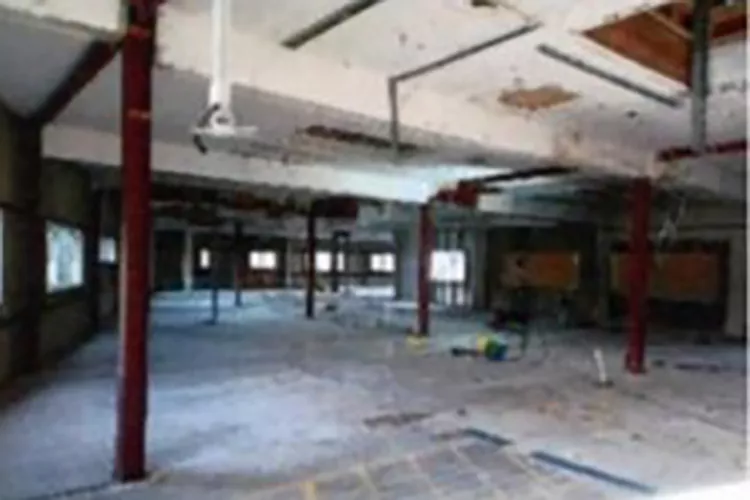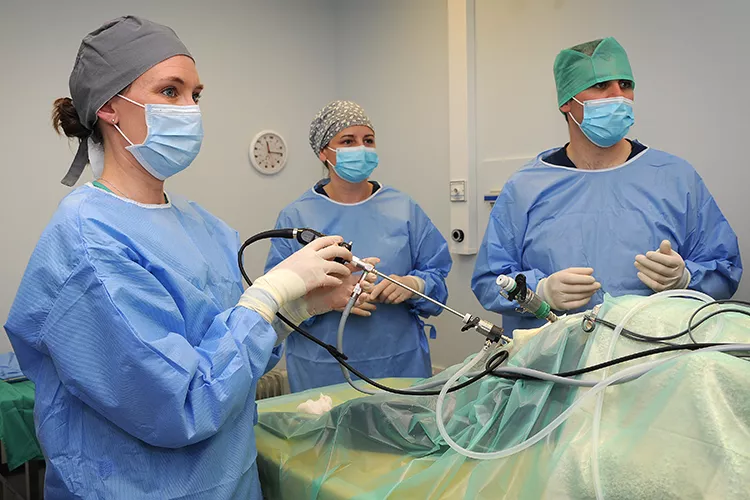
The ground floor of the building with AIB present on the walls.
A company director has been jailed for eight months after failing to protect workers from exposure to asbestos at a student development project in Winchester.
Stephen Davies, 59, had set up Cavendish Winchester Ltd with the sole purpose of refurbishing the Winnall Close commercial unit into student rental accommodation. His co-director Neil Bolton, 56, was spared an immediate spell behind bars when he was handed a four-month suspended sentence at Southampton Crown Court on 27 March 2024. The company itself was fined £30,000 – with all three defendants pleading guilty.
An investigation by the Health and Safety Executive (HSE) revealed the company removed an estimated ten tonnes of asbestos insulating board (AIB) during the refurbishment in late 2019 and early 2020. The dangerous materials were stripped out by workers unqualified to do the job and unaware of the risks to their health.
The investigation arose when HSE received a concern that large quantities of AIB had been illegally removed. The work was all carried out under the direction of Stephen Davies.
The court was told both directors were aware of the considerable extent and quantity of the materials containing asbestos within the building, as they had previously sought legitimate quotes for its competent removal.
However, they chose to save a considerable sum of money by avoiding properly planned, safe removal, by a Licenced Asbestos Removal Contractor. They knowingly exposed workers to significant risk to their health. In addition, the investigation was unable to determine where a very sizeable quantity of asbestos-contaminated debris ended up, such that others in the waste removal chain were likely to have been put at risk too.
All three defendants pleaded guilty to charges relating to a lack of adequate management of the removal of asbestos containing materials.
Both Stephen Davies and Neil Bolton pleaded guilty to Section 37 of the Health and Safety at Work etc Act 1974, by causing their company, The Cavendish Winchester Ltd, to breach Section 4(1) of the Act.
– Davies, of Petworth, West Sussex was given an immediate custodial sentence of 8 months in prison.
– Bolton, of Petworth, West Sussex was given a custodial sentence of four months, suspended for 12 month, with 250 hours of unpaid work and ordered to pay costs of over £5,123.
– The Cavendish Winchester Ltd, of Newtown House, Liphook, was fined £30,000.00.
Speaking after the hearing, HSE principal inspector Steve Hull said: “We brought this case because, despite the directors of this company being put on notice of the risks involved, they put profit before the health of those they employed.
“The dangers to health associated with exposure to asbestos fibres are well known and a wealth of advice and guidance is freely available from HSE and other organisations.
“Structural refurbishment which either exposes or is liable to expose people to asbestos fibres should only be carried out by competent persons working to a strict plan of work to ensure safety. Higher risk asbestos removal, such as the removal of AIB, can only legally be carried out by Licenced Asbestos Removal Contractors who have the knowledge and equipment to prevent the spread of fibres and properly protect the workers undertaking the removal work.
“This work involved the removal of an estimated ten tonnes of AIB.
“The defendants then tried to cover their tracks by legitimising the removal of a small amount of residual asbestos containing materials, after illegally stripping out the majority, by obtaining a new quote for legal removal of that very small remaining portion. This deliberate attempt to save money, when they knew full well that the workers would have to live with the possibility of developing serious asbestos-related disease in the future, makes the case particularly serious.”
This case was brought by HSE enforcement lawyer Kate Harney, who was supported by Paralegal Officer Helen Jacob

Midlothian and East Lothian Chamber of Commerce have confirmed two networking events this month.
A joint Chambers Networking Lunch is on at Norton House Hotel near Edinburgh Airport on April 17th (12.00 to 14.00) when businesses from East & Mid Lothian plus West Lothian come together.
The guest speaker is Tom Chambers from Alive Photos who will share his recent experience cycling from Edinburgh to Rome for the Italy v Scotland rugby match to raise fund for the My Name’5 Doddie Foundation.
A Business Breakfast is being held at Penicuik Storehouse on April 24 (8.30 to 10.30) when Our like-minded, environmentally committed businesses share ideas and build working relationships.
Each event focuses on different topics like energy efficiency, transport or green marketing and they including presentations from industry experts.
Also featured in the series are case study businesses who have saved money and won new customers through improving their environmental performance.
Penicuik Storehouse is a community benefit society serving as cafe and a community space for local people.
Attendees will learn how the organisation is improving the sustainability of their operation and how they engage with staff and building users.
For more informations see here www.melcc.org.uk/chamber-events

The vets from Heritage Vets performing keyhole surgery.
This View has been written by Midlothian Dog Trainer Nick McMechan.
The Competition and Markets Authority recently announced an investigation into the Veterinary industry. Following a survey of pet owners and veterinary surgeons in the UK. They have found multiple concerns in the industry which include being overcharged for medicines, reduction of choice and poor competition in some areas with pricing being unclear to the pet owner.
Many people may not be aware but there are six large chains in the UK which own 60% of practices. The proportion of independent practices has halved in ten years. When I look at my local practices in Dalkeith, who my own clients do rate highly, both practices are owned by large chains yet it took a bit of digging around on their websites to find this. As is often the case, its not obvious that your local practice is part of a big chain.
I do feel well placed to comment here. Having previously been an Area Manager with a large pharmacy chain, involved with healthcare professionals & supply of medicines and now a Dog Trainer, owning Esk Valley Dog Training. I also understand the the pricing and supply of medicines is not as straightforward as it seems. At the same time I have wondered at being charged in the region of £40 for medicine for my dog which can be supplied at a pharmacy for a couple of quid.
However, its more complicated than that. In particular medicines which have an animal licence will be priced differently to similar (or the same) medicines that are licensed for humans. Indeed, it is illegal for a vet to prescribe a human medication if there is a version licensed for animals, and the animal licensed options are usually far more expensive. These prices are set by the pharmaceutical companies, not the vets. Many factors go into pharmaceutical production and supply and economies of scale are indeed a factor as well as many others.
One of the actions we can take is to request a veterinary prescription from our practice and take that elsewhere to an online veterinary pharmacy to supply or you can take your veterinary prescription to your local pharmacy (note that in that case the pharmacist will have to make a professional judgement to supply and can refuse; please don’t be offended if they do as it won’t be personal). Your practice will charge you for the supply of the private prescription so you should take that into account as well as it may not necessarily be cheaper in the long run.
What you may also wish to consider is that your vet is a private healthcare provider. This means they are a business and have a responsibility to make a profit in order that they continue to provide their invaluable service and to invest in the advancements in veterinary healthcare that come along in the future. If we all take our veterinary prescriptions elsewhere those businesses will have to make up those lost profits somehow.
So, as I sit in the middle of this, what’s my choice. Its to move to an independent practice. My belief is that, whilst there are advantages to the large chains, I want somewhere local and personal that has the freedom to make decisions for the care of my animals that we need and want. I recently asked the new team at Heritage Vets about the recent media coverage:
“We will never be able to price our medications as low as the online pharmacies, and written prescriptions can be offered where appropriate for the client to source their own medications. At Heritage Vets we are in a privileged position due to being an independent vet practice.
“We have full control over our pricing, and we will be able to strike a balance between medication pricing and pricing for our services to be as accommodating as we can. The costs of veterinary care are increasing and will continue to do so though, so we would encourage all pet owners to take out pet insurance where possible to help cover unexpected costs.”
Heritage Vets will open in Thornybank, Dalkeith on 22nd April 2024. I’ve already registered to move my animals across and my family has too. We’ve had excellent service over the years with our previous vet but the attraction of a local independent vet and people who I respect have recommended them highly, means I have made the decision to have their care looked after there.
Nick specialises in Loose Leash Walking and Reactivity as well as everything you would expect from a great Dog Trainer. You can find out more here: eskvalleydogtraining.co.uk